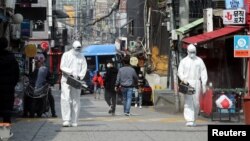An increase in coronavirus infections linked to a nightclub district in Seoul, South Korea, has sparked a backlash against the LGBTQ community after the outbreak was allegedly connected to gay people.
While South Korea has been largely successful in managing and suppressing its number of coronavirus cases in recent weeks, the surge of new cases connected to bars and nightclubs in Seoul has sparked concerns about a second wave of infections, as well as refreshed homophobic sentiments.
Twenty-nine of the new cases were found to be linked to Itaewon, a dining and nightclub district known to cater to members of the gay community.
Privacy concerns
Korea's attempts to trace potentially infected people have led to the disclosure of sensitive information, including the recent locations, of coronavirus patients. Privacy concerns have presented complications for officials, as some people have been hesitant to be tested for fear of being outed as a homosexual.
Health ministry official Yoon Tae-ho acknowledged that individuals could face discrimination if they came forward in a nation where homosexuality is taboo.
"We release the movement of confirmed patients to encourage anyone who might be exposed get tested voluntarily," he said in a briefing. "We urge you to refrain from distributing patients' personal information or groundless rumors, which not only hurts them but can also be subject to punishment," he said Monday at a news conference.
Official warning
Considering these concerns, officials on Monday issued an official warning against leaking the personal information of coronavirus patients.
"Leaking personal information of confirmed patients or spreading baseless rumors not only harms others but could be criminally punished," Yoon said.
Eighty-six people tested positive for the coronavirus in connection with the Itaewon outbreak, including people who had traveled to the capital and subsequently returned home, according to the Korean Centers for Disease Control and Prevention. Of the 86 who tested positive, 78 were men, and 76 were in their 20s and 30s.





